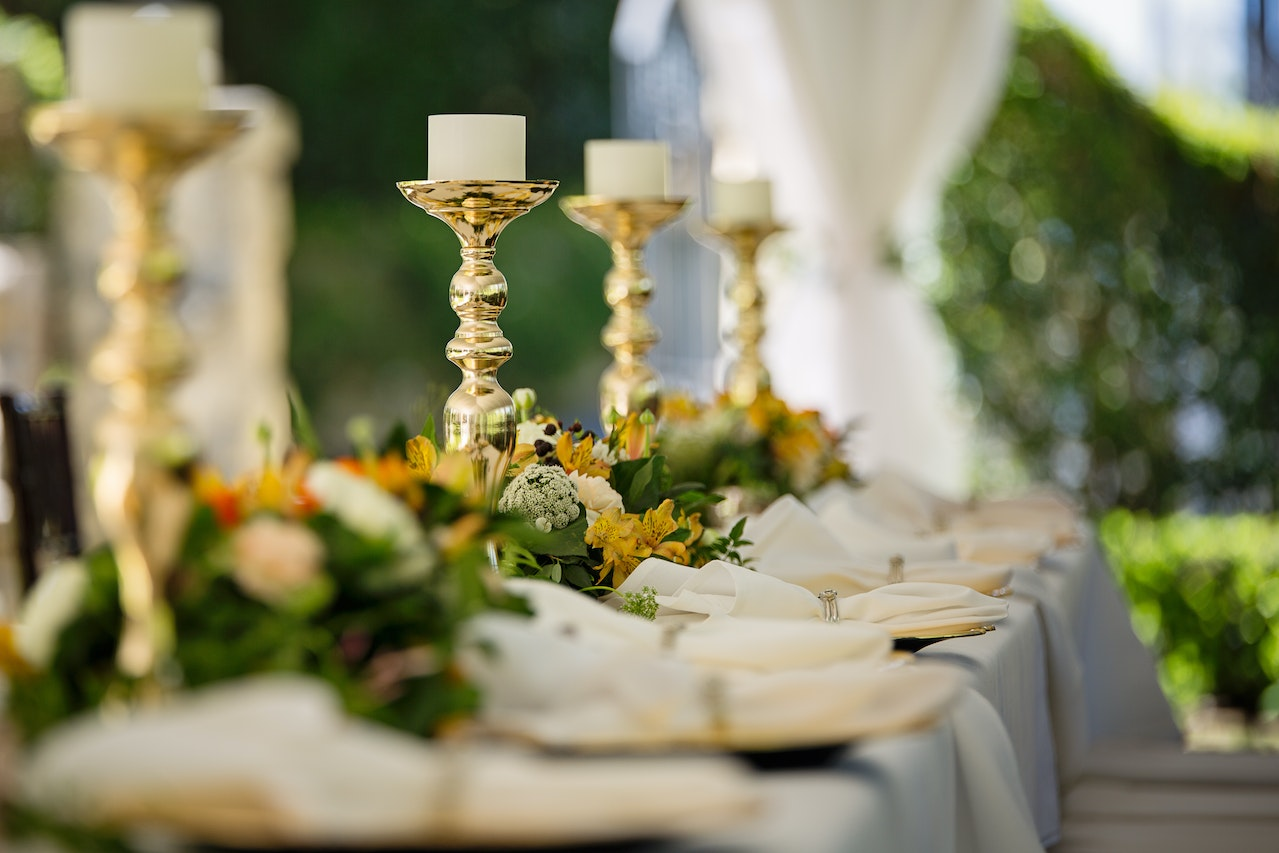
Hey there, party people! Have you ever found yourself daydreaming about turning your passion for planning fabulous celebrations into an event planning business? Wondering how to start a party planning business and make it a full career?
If so, you’re in the right place! Starting a party planning business can be a fantastic way to channel your creativity, organizational skills, and love for all things festive into a rewarding and lucrative career.
So, grab a cup of coffee (or perhaps a glass of bubbly), and let’s chat about everything you need to know to start your very own party planning business.
Are you ready? Let’s dive in!

Understanding the Day-to-Day of Event Planners
An event planner’s daily life is a delightful mix of creativity, logistics, and client relationships, always keeping them on their toes.
While no two days are exactly the same, there are a few essential tasks most event planners tackle on a regular basis:
1. Building connections with clients:
Event planners often chat with their clients, delving into their event dreams, preferences, and budgets.
It’s all about staying in touch, providing updates, and making sure their client’s vision comes to life beautifully.
2. Discovering the perfect venue:
Scouting and researching local venues is a key part of an event planner’s day. They consider factors like location, size, amenities, and cost to find just the right spot for their client’s celebration.
Establishing relationships with venue owners is just as important, as they typically keep a rolodex of wedding planners and party planners which can become potential customers.
3. Working with talented vendors:
Event planners collaborate with various vendors, from local caterers, photographers, entertainers and florists.
They negotiate contracts, coordinate schedules, and ensure that each vendor delivers their services in line with the client’s expectations.
4. Keeping an eye on the budget:
Managing the event’s budget is crucial. Event planners track expenses, make necessary adjustments, and always strive to ensure the event stays within the allocated budget.
5. Crafting the perfect atmosphere:
Event planners help create the overall look and feel of the event. They play with elements like color schemes, lighting, and decorations to design a cohesive and visually stunning space.
6. Mastering the art of timing:
Detailed timelines and schedules are essential for successful parties. Event planners manage setup, teardown, and the event program, while also coordinating logistics like transportation, parking, and guest accommodations.
7. Spreading the word:
For certain social events, like corporate gatherings or public functions, event planners may also dive into marketing and promotion.
This can include designing promotional materials (with the help of a graphic designer), managing social media, and reaching out to potential attendees.
8. The big day:
On the day of the event, event planners oversee every aspect of the event’s execution.
They ensure that everything runs like clockwork, troubleshoot any issues that arise, and act as the go-to person for clients, vendors, and guests.
9. Wrapping it up:
Post-event, planners collect feedback from clients and guests, review vendor invoices, and conduct a thoughtful analysis to identify areas for growth and improvement.
10. Keeping it all organized:
Administrative tasks, such as invoicing, contract management, and client file maintenance, also fill an event planner’s day.
In essence, an event planner’s daily life is filled with a variety of responsibilities that range from artistic design to practical coordination.
Their ultimate aim is to create unforgettable and flawlessly executed events that delight their clients and guests alike.
That’s the high-level of a day in the life of an event planning company. Now with that, let’s get into the step-by-step how to get started!

Section 1: Finding Your Party Planning Niche
Finding your event planning business niche can feel like searching for a hidden treasure, but the rewards are definitely worth it.
Let’s explore various examples of party planning niches, help you discover your own unique focus, and introduce you to inspiring women who have successfully built their event planning empires.
1. Identifying Your Niche
To find your niche, you need to consider your passions and interests, your unique skills and strengths, and your target market. Ask yourself the following questions:
What types of parties do you enjoy the most? (e.g., children’s birthdays, themed events, or corporate gatherings)
What aspects of party planning excite you? (e.g., decoration, catering, or entertainment)
What makes you stand out from the competition? (e.g., a distinctive style, cultural background, or expertise in a specific area)
By answering these questions, you’ll gain a better understanding of your preferences and potential niches.
2. Exercises to Discover Your Niche
Here are a few exercises to help you uncover your niche in the events industry:
Create a vision board: Compile images, colors, and words that represent your ideal parties and events. Look for patterns and recurring themes.
Conduct market research: Interview friends, family, and prospective clients to identify their party planning preferences and needs. See what your competition in the events industry is doing.
Write a mission statement: Craft a statement that outlines your unique approach to party planning and what you want to achieve.
3. Examples of event planning business Niches
When you start an event planning business, there’s a plethora of niches to choose from, so let’s look at a few examples:
Children’s birthday parties: If you love working with kids and have a knack for creating magical experiences, this niche may be perfect for you.
Wedding planning: for those in the business of love!
Milestone celebrations: From sweet sixteen parties to golden anniversaries, milestone events provide plenty of opportunities to flex your creative muscles.
Themed parties: If you’re passionate about specific themes or eras, this niche allows you to incorporate your interests into your events.
Green and eco-friendly events: For the environmentally conscious planner, focusing on sustainable and eco-friendly practices can set you apart from the competition.
Luxury events: If you have a taste for the finer things in life and a keen eye for detail, high-end party planning could be your calling.

4. Inspiring Women in the Event Planning Industry
Let’s take a look at a few of the many event planners who have built thriving event planning businesses:
– Mindy Weiss: A celebrity event planner who has worked with clients such as Ellen DeGeneres, Sofia Vergara, and Kim Kardashian. Mindy’s creativity and attention to detail have made her a go-to planner for A-list events.
– Lynn Easton: As the founder of Easton Events, Lynn specializes in luxury weddings and celebrations. With an elegant, timeless style, she has built a reputation for creating unforgettable experiences for her clients.
– Marcy Blum: With over 30 years of experience, Marcy Blum is a true trailblazer in the event planning world. Her innovative ideas and dedication to perfection have made her a sought-after planner for high-profile clients.
Finding your party planning niche is a journey of self-discovery that allows you to combine your interests and strengths in a way that sets you apart from the competition.
By exploring different niches, engaging in self-reflection, and drawing inspiration from successful women in the industry, you’ll be well on your way to carving out a unique and fulfilling niche in the event planning business.
Section 2: Getting Down to Business Basics
Once you’ve chosen your niche, it’s time to tackle the nitty-gritty details of starting an event planning business.
Don’t worry, it’s not as daunting as it might seem! Here are some essential steps to get your event planning business off the ground:
1. Choose a fabulous business name:
Pick a business name that reflects your brand, style, and the type of events you’ll be planning. Be sure it’s catchy, memorable, and easy to spell.
2. Get Legal
As a new event planner, it’s essential to properly register your business and take care of all the legal aspects and tax implications. Here’s what you need to do:
Trademark search: Before you fall in love with your business name, do a quick search on the United States Patent and Trademark Office (USPTO) website to ensure your business name isn’t already taken or too similar to an existing one.
Choose a business structure: It’s time to decide what kind of business structure is best for your event planning service. The most common choice is a limited liability company (LLC), as it offers protection for your personal assets and has tax advantages. You could also consider a sole proprietorship or a partnership.
Register your business: Once you’ve settled on a structure, it’s time to make it official! Register your business entity with your state’s Secretary of State office. The process may vary slightly depending on your location, but it generally involves filing articles of organization and paying a filing fee.
Apply for an EIN: You’ll need an Employer Identification Number (EIN) from the IRS for tax purposes. It’s easy to apply for one online and it’s free!
Open a business bank account: Keep your personal and business finances separate by opening a dedicated business bank account. This will make it easier to manage your finances and avoid any potential tax headaches down the road.
Get business insurance: Protect your event planning business by investing in the right insurance policies. General liability insurance is a must-have, and you may also want to consider professional liability insurance (also known as errors and omissions insurance). Shop around for the best coverage and rates.
Check for local permits and licenses: Depending on your location, you may need additional permits or licenses to operate your event planning business. Check with your local government to find out if there are any specific requirements in your area.
Set up accounting: Stay organized and on top of your startup costs and finances by setting up an accounting system. There are plenty of user-friendly software options, like QuickBooks for small businesses, that can help you keep track of income and expenses.
By following these steps, your event planning business should be well covered should any storms arise.

3. Create a business plan:
When you start an event planning business, creating a business plan is a crucial step in the process that will help you define your goals, map out your strategies, and ultimately set your new business up for success.
Here’s a guide to help you create a business plan for your new event planning venture.
1. Executive summary: The executive summary is the first section of your business plan, providing an overview of your entire plan. This section should be concise and compelling, as it’s often the first impression you’ll make on potential investors or partners.
2. Company description: In this section of your business plan, you’ll provide more details about your event planning service. Describe the services you plan to offer, the niches you want to target, and how your business stands out from the competition. Include your mission statement, business structure, and any long-term goals you have in mind.
3. Market analysis: A thorough market analysis is a vital part of your business plan. Research your target market, including potential customers and competitors. Identify the trends and opportunities within the event planning industry, as well as any challenges or threats you may face.
4. Marketing and sales strategy: In this part of your business plan, outline how you plan to attract and retain clients. This can include strategies like social media marketing, attending networking events, and offering promotions or discounts for new clients. Be sure to explain how you’ll measure the success of your marketing efforts.
5. Operations and management: The operations and management section of your business plan should detail how your event planning business will function day-to-day. This includes information about your team (if applicable), the tools and software you’ll use, and any processes you’ll follow to ensure smooth operations.
6. Financial projections: The last section of your business plan should provide financial projections for your event planning service. This includes a projected income statement, balance sheet, and cash flow statement. Be realistic but optimistic, and use any market research or industry data to support your projections.
Remember, a well-crafted business plan is not only important for securing funding or partnerships but also serves as a roadmap to guide you as your event planning business grows.
By following these steps and putting thought into each section of your business plan, you’ll be prepared to start an event planning business that is successful and sustainable.
4. Set your pricing:
As a new event planner, determining your pricing structure can be a bit daunting.
Striking the right balance between attracting clients and ensuring that you’re fairly compensated for your work is essential.
Let’s explore pricing ideas for new event planners in various niches.
1. Children’s Parties Pricing
Creating magical memories for little ones is an absolute delight, and as a children’s party planner, your fees should reflect your expertise and the unique experience you offer.
Pricing for this niche typically ranges from $300 to $1,000 per event, depending on factors like the size of the party, the complexity of the theme, and the materials needed.
To provide more flexibility, consider offering tiered packages with different levels of service, ranging from basic coordination to all-inclusive party planning.
2. Milestone Celebrations Pricing
Whether it’s a special birthday, an anniversary, or a retirement party, milestone celebrations hold a special place in people’s hearts.
Event planners in this niche can charge between $500 and $3,000 per event, depending on the size, location, and intricacy of the celebration.
To cater to various budgets, you might offer à la carte services, such as assistance with venue selection, catering coordination, or decor design.
3. Corporate Events Pricing
Planning corporate events, from product launches to holiday parties, requires a different skill set and understanding of the business world.
As a new event planner in this niche, you can charge anywhere from $1,000 to $10,000 or more per event, depending on the size, scale, and complexity of the event.
Offering tiered packages or charging an hourly rate (typically ranging from $50 to $150 per hour) can provide additional flexibility for clients with varying budgets.
4. Weddings Pricing
Weddings are momentous occasions, and couples often seek professional help to ensure their big day is flawless.
As a new wedding planner, you can charge between $1,500 and $5,000 for full-service planning or a percentage of the total wedding budget (usually 10-20%).
For more budget-conscious couples, consider offering partial planning services, day-of coordination, or an hourly rate (usually between $50 and $150 per hour) for consultation and guidance.
5. Non-profit and Charity Events Pricing
Organizing fundraisers, galas, and other non-profit events can be incredibly rewarding, but it’s essential to be mindful of the organization’s budget constraints.
For this niche, you might charge a flat fee (ranging from $500 to $5,000) or a percentage of the event’s proceeds.
Alternatively, consider offering your services at a discounted rate or even pro bono for causes close to your heart.
Remember, when developing a pricing strategy, consider factors such as your experience, the local market, and the specific services you offer.
As you gain experience and build your reputation, you can adjust your rates accordingly. Don’t be afraid to experiment with different pricing structures to find what works best for you and your clients.
5. Build your portfolio:
Building a portfolio as a new event planner is an exciting opportunity to showcase your creativity, expertise, and the unique touch you bring to every event you plan.
Let’s explore some ideas on how to build and display a portfolio that truly reflects your talents in various niches.

1. Portfolio for Children’s Parties
Capture the magic and whimsy of children’s parties by showcasing your flair for imaginative themes, fun activities, and captivating decorations.
Include high-quality photographs that highlight your attention to detail, from colorful table settings to playful party favors.
To help potential clients envision their own events, consider categorizing your portfolio by themes, such as princess parties, superhero adventures, or safari expeditions.
2. Portfolio for Milestone Celebrations
Demonstrate your ability to create unforgettable moments for milestone celebrations by highlighting the unique elements that make each event special.
Showcase a diverse range of events, from intimate gatherings to lavish soirées, and include images of personalized touches, such as custom invitations, meaningful centerpieces, or memorable entertainment options.
Organize your portfolio by event type or theme to help clients easily find inspiration for their own celebration.
3. Portfolio for Corporate Events
To appeal to a professional audience, emphasize your expertise in creating polished, well-organized corporate events.
Include images of sleek and sophisticated décor, innovative presentations, and interactive team-building activities.
Group your portfolio by event type, such as product launches, conferences, or holiday parties, and highlight any industry-specific experience you may have.
4. Portfolio for Weddings
Weddings are all about love and personal connections, so your portfolio should tell a visual story of each couple’s special day.
Feature a variety of weddings to showcase your versatility and ability to adapt to different styles, budgets, and locations.
Include images of the ceremony, reception, and details like floral arrangements, table settings, and wedding favors.
Organize your portfolio by wedding style, such as rustic, elegant, or beach-themed, to help couples find inspiration that aligns with their vision.
5. Portfolio for Non-profit and Charity Events
In this niche, your portfolio should demonstrate your ability to create impactful, meaningful events on a budget.
Include images that capture the essence of the cause, the atmosphere of the event, and any unique fundraising elements, such as auctions, performances, or themed activities.
Organize your portfolio by event type or cause to help non-profit organizations find ideas relevant to their mission.
When displaying your portfolio, consider creating a visually appealing website that is easy to navigate, with separate sections for each niche.
Incorporate client testimonials and case studies to provide potential customers with a deeper understanding of your process and the impact your events have had.
Don’t forget to share your portfolio on social media and use targeted hashtags to reach a wider audience.
Lastly, remember that your portfolio is a living document for your event planning service that should be updated regularly as you gain experience and create new, inspiring events.
Section 3: Networking and Building Strategic Relationships
Building a successful event planning business is about more than just organizing spectacular events; it’s also about fostering meaningful connections and strategic relationships within your industry.
Let’s explore ways to network and create lasting partnerships as a new event planner in various niches.
1. Attend Industry Events
Keep an eye out for conferences, workshops, and trade shows tailored to your niche, such as wedding expos, corporate event seminars, or charity event fundraisers.
These gatherings offer valuable opportunities to meet like-minded professionals, learn about new trends, and exchange business cards.
Don’t be shy—introduce yourself, ask questions, and engage in authentic conversations to form genuine connections.
2. Collaborate with Complementary Businesses
Working closely with small businesses that complement your event planning niche can be mutually beneficial.
For example, consider partnering with local florists, caterers, photographers, or entertainers.
By referring clients to one another and showcasing each other’s work, you can create a network of trusted professionals who support each other’s growth.
3. Join Local Business Groups
Becoming an active member of your local chamber of commerce or a business networking group can help you connect with fellow entrepreneurs in your community.
Attend meetings, participate in discussions, and volunteer for leadership roles to demonstrate your commitment and build a strong reputation.
4. Utilize Social Media
Social media platforms like Instagram, LinkedIn, and Facebook can be powerful tools for networking and showcasing your event planning expertise.
Share behind-the-scenes glimpses of your events, client testimonials, and examples of your work. Engage with other professionals in your niche by liking, commenting, and sharing their content.
Join relevant online communities and forums where you can ask questions, share advice, and connect with others in your industry.
5. Offer to Speak or Host Workshops
Share your knowledge and experience by offering to speak at industry events or host workshops on event planning topics.
This not only positions you as an expert in your niche, but also provides a platform for meeting prospective clients and partners.
6. Volunteer Your Services
Consider donating your event planning skills to a local non-profit organization or charity event.
Not only will you be contributing to a good cause, but you’ll also have the opportunity to meet influential individuals and showcase your talents to a broader audience.
7. Foster Long-Term Relationships
Building strategic relationships is an ongoing process.
Make a conscious effort to stay in touch with the connections you’ve made through regular check-ins, thoughtful gestures, or even sending holiday cards.
A genuine, long-lasting partnership is built on mutual trust and support.
By embracing these networking strategies and fostering meaningful connections in your event planning niche, you’ll be well on your way to creating a flourishing event planning business surrounded by a supportive community.

Section 4: Marketing Your Own Event Planning Business
Now that you’ve laid the groundwork for your own event planning business, it’s time to spread the word and attract clients! Here are some steps to build a marketing strategy:
1. Leverage Social Media, again!
Social media platforms like Instagram, Facebook], and LinkedIn are excellent places to showcase your work and connect with potential clients.
Share behind-the-scenes glimpses of your events, client testimonials, and beautiful snapshots of your creations.
Engage with your audience by responding to comments and messages on your social media accounts, and consider collaborating with influencers in your niche to expand your reach.
2. Attend Networking Functions
One of the most effective ways to generate leads is by attending industry events and networking functions.
Websites like Eventbrite and Meetup are great resources for finding relevant gatherings.
These events offer a prime opportunity to meet prospective clients, collaborate with other professionals, and gain valuable insights into your niche.
Bring your business cards, practice your elevator pitch, and always be prepared to discuss your services.
3. Build a Stunning Website
Your website serves as a digital portfolio and is often the first impression potential clients will have of your event planning service.
Platforms like Squarespace can help you create a professional, visually appealing, and easy-to-navigate website.
Include a portfolio showcasing your best work, a blog with valuable content related to your niche, and clear calls-to-action encouraging visitors to contact you.
4. Create Valuable Content
Offering valuable content related to your niche helps establish your expertise and attracts potential customers.
Write informative blog posts, create engaging videos, or host webinars discussing trends and tips in your niche.
Share this content on your website, social media, and in email newsletters using tools like Mailchimp or Constant Contact.
5. Collaborate with Complementary Businesses
Partner with complementary businesses in your niche to expand your network and generate referrals.
Online directories like Yelp or Google My Business can help you find relevant businesses to connect with.
Offer to promote their services in exchange for them recommending your event planning expertise to their clients.
6. Offer Incentives for Referrals
Encourage satisfied clients to refer you to their friends, family, and colleagues by offering incentives such as discounts on future services or exclusive gifts.
Platforms like ReferralCandy or Yotpo can help you create and manage referral programs.
7. Join Professional Associations
Becoming a member of professional event planning associations, such as ILEA or NACE, can help you connect with others in your niche, gain access to valuable resources, and enhance your credibility.
Some associations even offer directories where you can list your business, making it easier for potential customers to find you.
8. Utilize Local Advertising
Don’t underestimate the power of local advertising, especially if you’re targeting clients within a specific geographic area.
Creating marketing materials and door hangers in your niche’s neighborhood can still be effective.
Participate in Community Events and Sponsorships
Getting involved in your local community can help you create a positive reputation and build connections, which is everything when starting an event planning venture.
Participate in community events, such as fundraisers, charity events, or local fairs, where you can showcase your event planning skills.
Offer to sponsor events or donate your services to small businesses in exchange for recognition and potential referrals.
10. Utilize Online Advertising
Online advertising platforms like Google Ads and Facebook Ads can help you reach your target audience in your chosen niche.
Create targeted ad campaigns to attract potential clients who are actively searching for event planning services.
Be sure to monitor your campaigns and adjust your targeting and budget as needed to optimize your results.
11. Seek Out Client Testimonials and Reviews
When you first start an event planning business, positive testimonials and reviews from happy clients can significantly impact your reputation and help attract new leads.
Encourage satisfied clients to leave reviews on platforms like Yelp, Google My Business, or WeddingWire (if you’re in the wedding niche).
Include these testimonials on your website and share them on social media to showcase your expertise and the quality of your work.
12. Develop a Strong Personal Brand
Your personal brand is a powerful tool in attracting new clients – especially when first starting an event planning venture.
Create a strong, cohesive brand across all your marketing channels, including your website, social media, and business cards.
Be authentic and personable, allowing potential clients to connect with you on a personal level. This can help you stand out from the competition and create a loyal following.
By incorporating these strategies into your marketing efforts, you can increase your visibility, build your reputation, and generate leads for your own event planning business in your chosen niche. Remember, success takes time and persistence, so stay dedicated and keep refining your approach as you learn and grow.

Section 5: Keep Learning and Growing
As a party planner, it’s essential to stay on top of industry trends and continually hone your skills. Here are some ways to keep learning and growing in your craft:
1. Attend industry conferences and workshops:
Regularly attend events and workshops to learn from experts, network with peers, and stay up-to-date on the latest trends and techniques.
2. Obtain professional certifications:
Consider obtaining certifications from professional organizations like the Association of Bridal Consultants or the International Special Events Society to enhance your credibility and expertise.
3. Connect with a mentor:
Seek out an experienced party planner who can offer guidance, support, and advice as you navigate the challenges and triumphs of starting your business.
Conclusion
Starting your own event planning business can be an exciting and fulfilling adventure, and with the right foundation, determination, and a little sparkle, you’re well on your way to turning your passion into a thriving career.
Remember to stay true to your unique vision, never stop learning, and always keep the party going.
Good luck, and cheers to your future success!




Leave a Reply